Fashn Rooms: more compact and less footfall
At Fashn Rooms, there was not much going on at midday on Saturday. The fair moved to the neighbouring “Kaltstahlhalle”, which provided a more compact area at the Areal Böhler event site. Exhibitors, however, were not worried and hoped for more visitors on Sunday and Monday, which are known to be busier days.
Thanh Minh has been attending the Igedo trade fair formats in Düsseldorf for more than 20 years, including Fashn Rooms from the very beginning. The founder of the eponymous Cologne-based brand is of the opinion that trade fairs as a whole need to become smaller. This is why he feels that the more compact Fashn Rooms concept is the right one.
Minh has significantly reduced the size of his booth as well as his collection, which specialises in microfibre products. He only produces – 90 percent in Portugal – what customers in his boutique order – and therefore has no problems with inventory.
Minh is not too concerned about the footfall at the fair, even if there is not much going on at his booth. He had previously been at a trade fair in Wiesbaden, where his convertible coat was very well received. At 99 euros, the price is particularly convincing, as is the adaptability of the piece: The coat has zippers at elbow level through which the arms can be slipped on warmer days, explains Minh. Additional straps on the inside allow the coat to be worn on the back like a bag pack.
For Tanja Wiesent, area manager for Central, Northern and Eastern Europe at Desigual, this is also not the first time at Fashn Rooms. The fair is still very important for the Spanish brand, as they no longer have their own showroom in Düsseldorf and can only present their collection at the fair alongside showrooms in Berlin and Munich. Together with her colleague Victoria Heise, sales manager Germany, she has scheduled many appointments beforehand and is therefore not worried about the extremely quiet first day. She is sure that the other two days, Sunday and Monday, will be the busiest, as usual. She has also already spoken to a potential new customer on Saturday.
Heise confirms that topics such as sustainability and close cooperation are very popular with existing and new retail partners. Desigual responds to pressing issues such as inventory shortages with its own sales platform, which allows retailers to reorder items in-season. Nevertheless, the two have also noticed that the unstable weather is making sales difficult, especially for their speciality items, which is summer dresses. Customers tend more towards “transitional fashion” with pants, light knitwear and sweaters. However, the brand’s denim print, which can be found on simple tops and dresses, is also popular. Otherwise, Desigual continues to focus on many bright colours such as apricot, turquoise and coral.
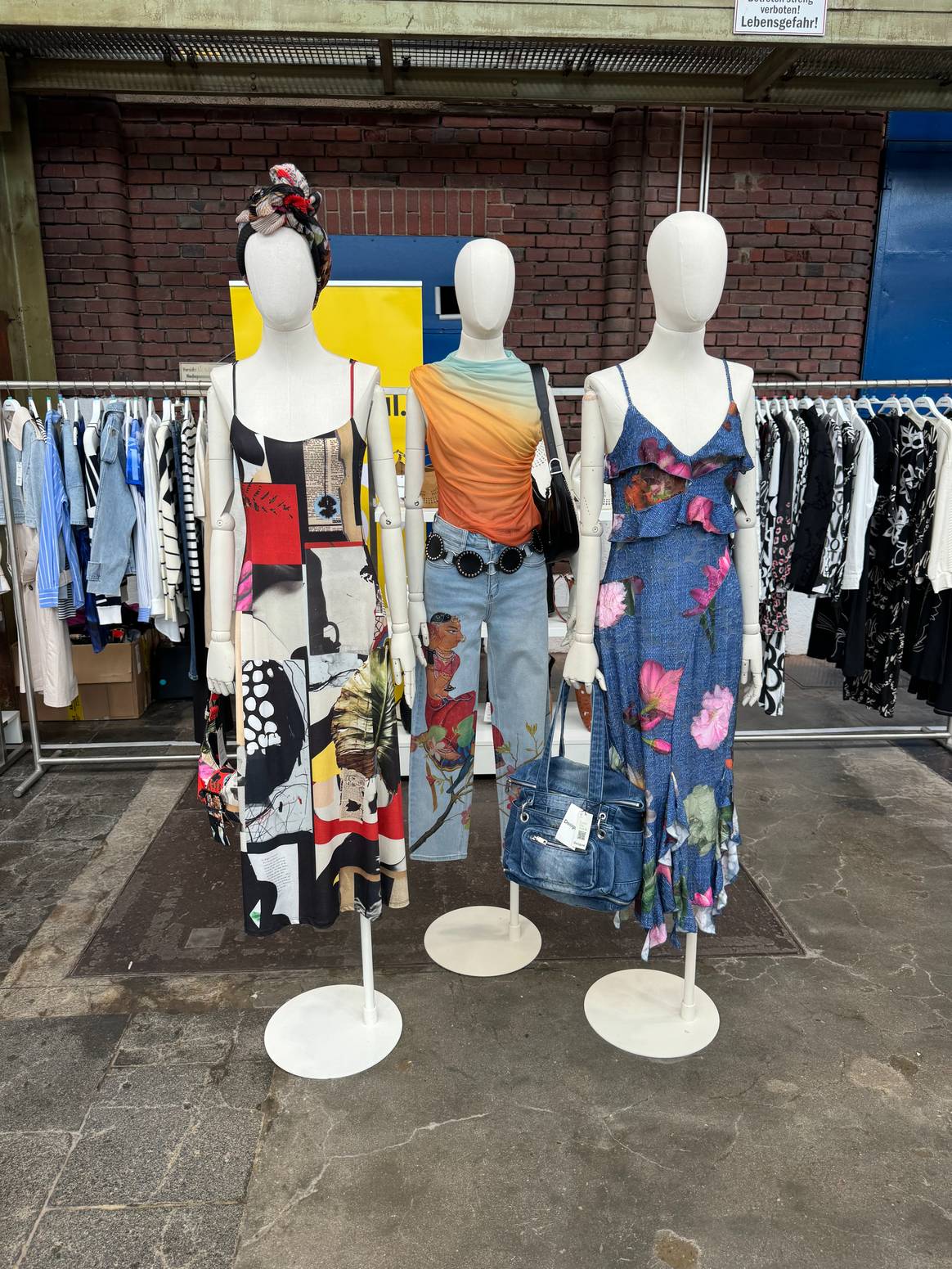
Caroline Raffauf is at Fashn Rooms for the first time, with her brand Raffauf. Looking at the empty aisles, she is hoping for more walk-in customers in the coming days. She was unable to schedule any appointments for her design-oriented outerwear brand. Many retailers would see her products more as an addition to the collection and would therefore concentrate primarily on their appointments with other brands. In Munich, she will be represented at trade fair Supreme, which starts the weekend after next. In Düsseldorf, however, where Supreme Women & Men is centrally located between the showrooms on Kaiserswerther Strasse, Raffauf opted for Fashn Rooms because she feels she fits in better with the brands there.
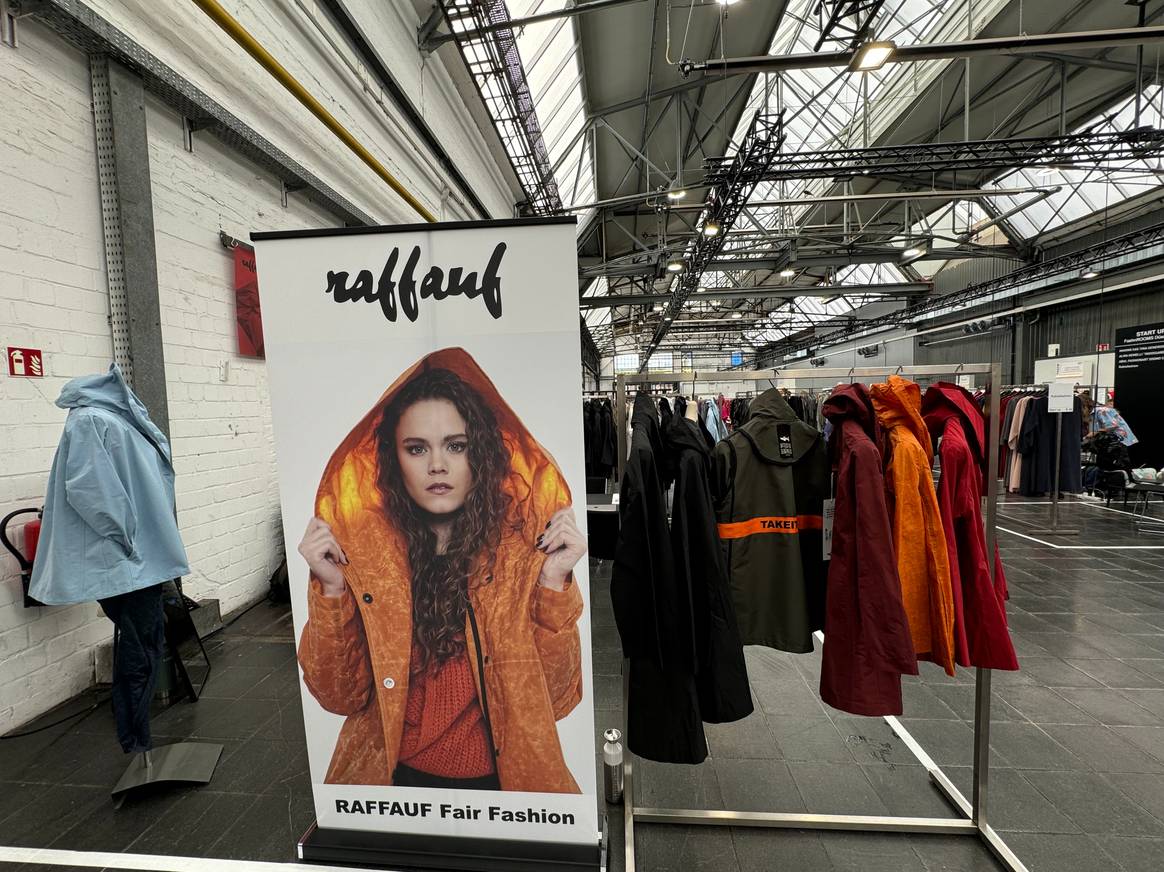
The industry meets at Kaiserswerther Straße
Supreme Women & Men already seems to be busier on Saturday, the second day of the fair. “It is becoming increasingly clear that our location on Kaiserswerther Straße makes us one of the most important points of contact for the protagonists,” said a spokesperson for the trade fair organiser. The frequency of visitors was “very good” throughout the weekend. On Friday and Saturday, high-calibre buyers had come to order and view the collections.
The organisers also noticed that more customers from Austria and southern Germany had travelled to Düsseldorf. Overall, the trade fair sees itself more and more as a networking event. Casual exhibitor get-togethers on the first two days of the fair also attracted individuals and agencies from the surrounding showrooms as well as buyers.
For Michiel van Dercruyssen from Dropout Agency, it is his first time at Supreme. He represents US sneaker brand Etonic, which just launched on the German market with sneaker retailers such as Asphaltgold, Afew and BSTN in the menswear sector. Now the shoe retailer also wants to establish its women’s models in Germany. Last season, womenswear made up 80 percent of the brand’s range, this season it is only 60 percent. For Etonic, which is already represented in Belgium, the Netherlands and Luxembourg (BeNeLux) as well as in the United Kingdom, Spain, Italy and the Nordics, the first time in Düsseldorf is all about creating visibility rather than writing lots of orders straight away. That is why the rather “quiet days” of Friday and Saturday, as Van Dercruyssen describes them, are not a problem.
“We’ll just come back the next season and the season after that until it works,” he explains the strategy. This is also how it worked when starting in the French market. In Van Dercruyssen’s focus market of BeNeLux, where the brand has increased its turnover from 5,000 euros to one million euros in the last five years, the brand representative is noticing a reluctance on the part of retailers. The effects of the pandemic are now really being felt there. However, Etonic is trying to stay in close contact with its retail partners and is also offering them the opportunity to skip an order season, which is unthinkable with major competitors such as New Balance and Nike. The fact that Etonic only produces what retailers have ordered in its own production facilities in China means that the brand has no problem with its inventory levels.
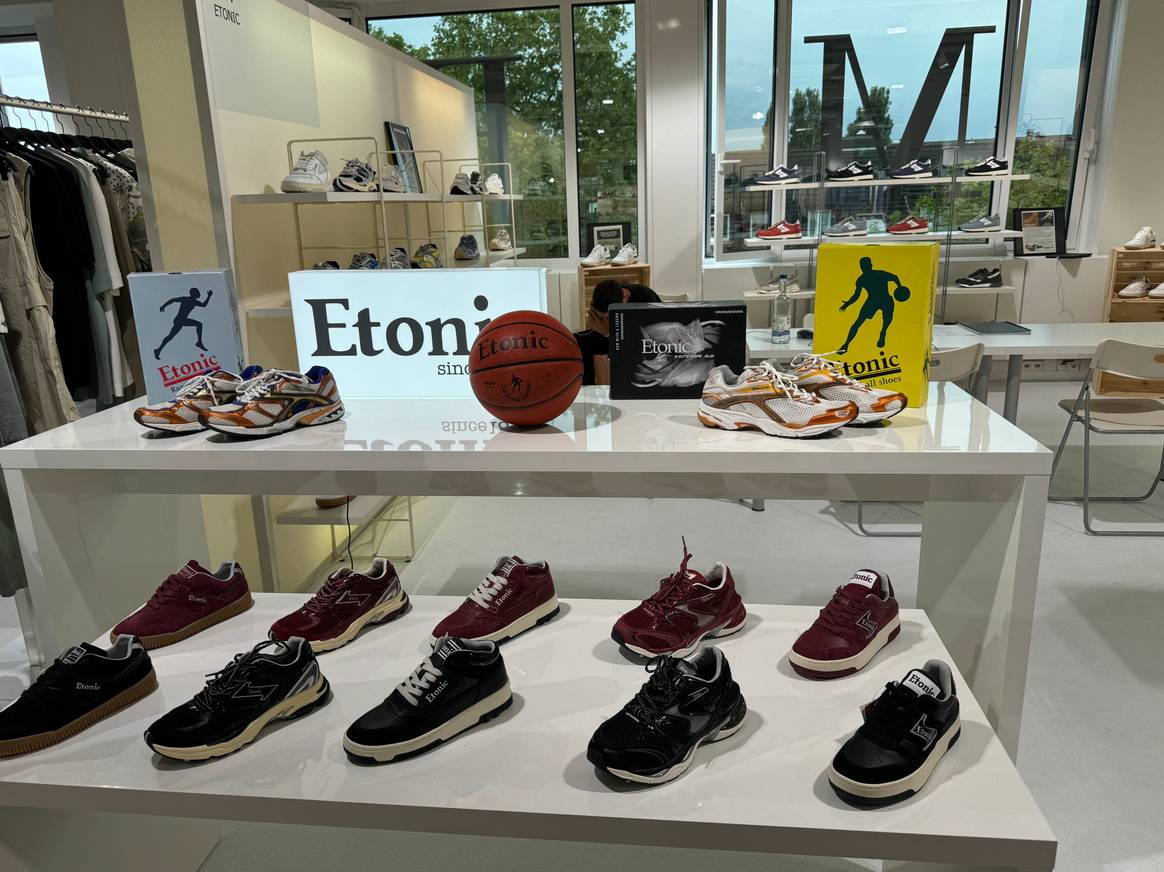
The Von&Zu brand follows a similar approach, explains Eva-Maria Czerny, who is responsible for sales at Czerny Manufaktur GmbH, the family-run company behind the premium label. The womenswear specialist focuses on limited collections, with the exact quantity produced of each item printed on its label. In addition, the brand only produces what has been pre-ordered. Should there be a need for additional items from retail partners, the brand connects them with each other so that demand can be covered by another store’s stock.
The company, which offers only two delivery dates a year, has received good feedback from retailers despite the weather-related difficulties, but also emphasises that collections need to become more transseasonal overall. Von&Zu is therefore focussing on new cuts and different materials, with cotton knitwear playing a leading role this summer. Czerny has also included pieces such as a light leather blazer. Von&Zu adapts its processing to maintain its pricing and not scare off the already sensitive market According to Czerny, they would for example use a simpler seam instead of a French seam – savings that do not necessarily affect the quality.
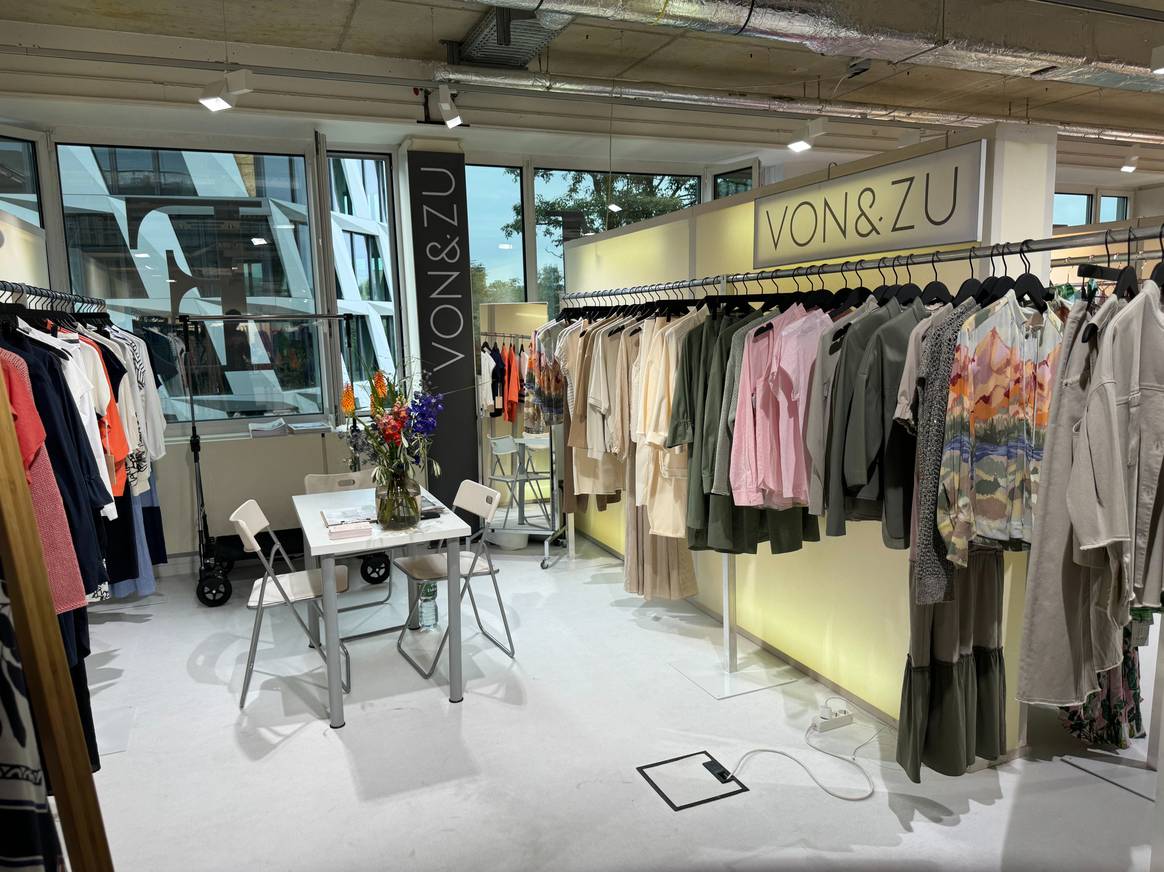
Meanwhile, Herrlicher founder Erwin Licher is satisfied with his brand’s representation at Supreme. The footfall was good so far, but it was more about the presence at the trade fair than the orders. Existing customers will visit the two showrooms, with the menswear area just a few doors down from Supreme on Kaiserswerther Strasse. Knitwear is also doing well at Herrlicher, even with a touch of glitter, which the brand has incorporated in its range for several seasons now. In addition to clothing, the brand has also been offering shoes since the previous season, rounding off the collection.
B2C focus at Neonyt
Reach also seems to be the keyword for sustainability-oriented trade fair Neonyt, which for SS25 no longer shares the same space as Fashn Rooms. It is now at a separate location at “Bilker Bunker”, a former air raid shelter in the city’s southern district of Bilk. The event space is another point of contact for visitors that is not in the immediate vicinity of other showrooms and formats.
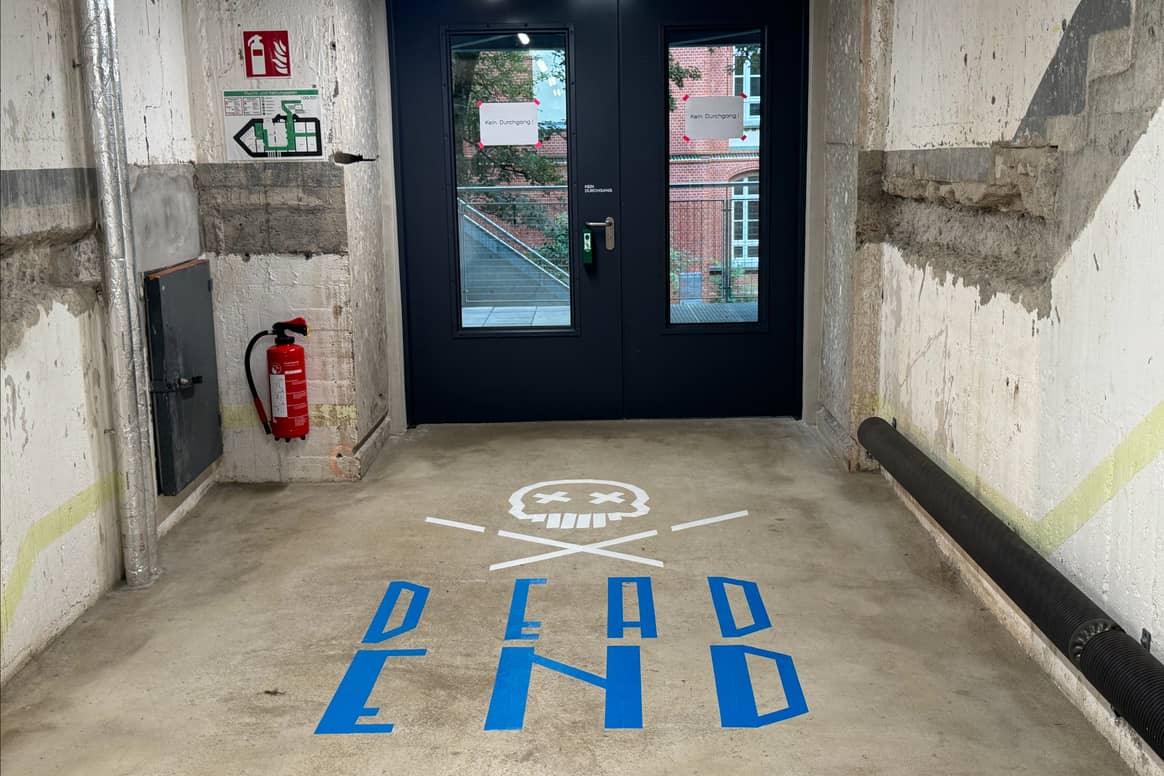
The fair’s new concept, which is also open to end consumers in the late afternoon, is spread over three floors of the rather small, labyrinthine location. One of the few well-known names on the list of around 50 exhibitors is local brand Wunderwerk, which has one of the larger booths in the entrance area.
Heiko Wunder, managing director of the Rheinstoff E-Commerce GmbH, sees the brand’s presence at the fair more as an info booth to provide information about the sustainability-oriented brand. It currently focuses on a business-to-consumer model and is otherwise available only at Mode Weber in Switzerland and Woggon in Göttingen. At Neonyt, taking orders is not an objective and the booth reflects that as Wunder explains.
From a wholesale perspective, the move from Areal Böhler, where retailers also had sufficient parking facilities, was “almost sad” according to Wunder. Nevertheless, he praised organiser Igedo, which operates the fair under licence. The Wunderwerk boss, rescued his brand from insolvency last year and is still looking for investors to take on the brand’s wholesale business. Though currently in talks with various clothing brands, Wunder seems more concerned with supply chain problems and the fact that he has to make advance payments to his fabric suppliers, sometimes having to pay for 10,000 metres of fabric directly.
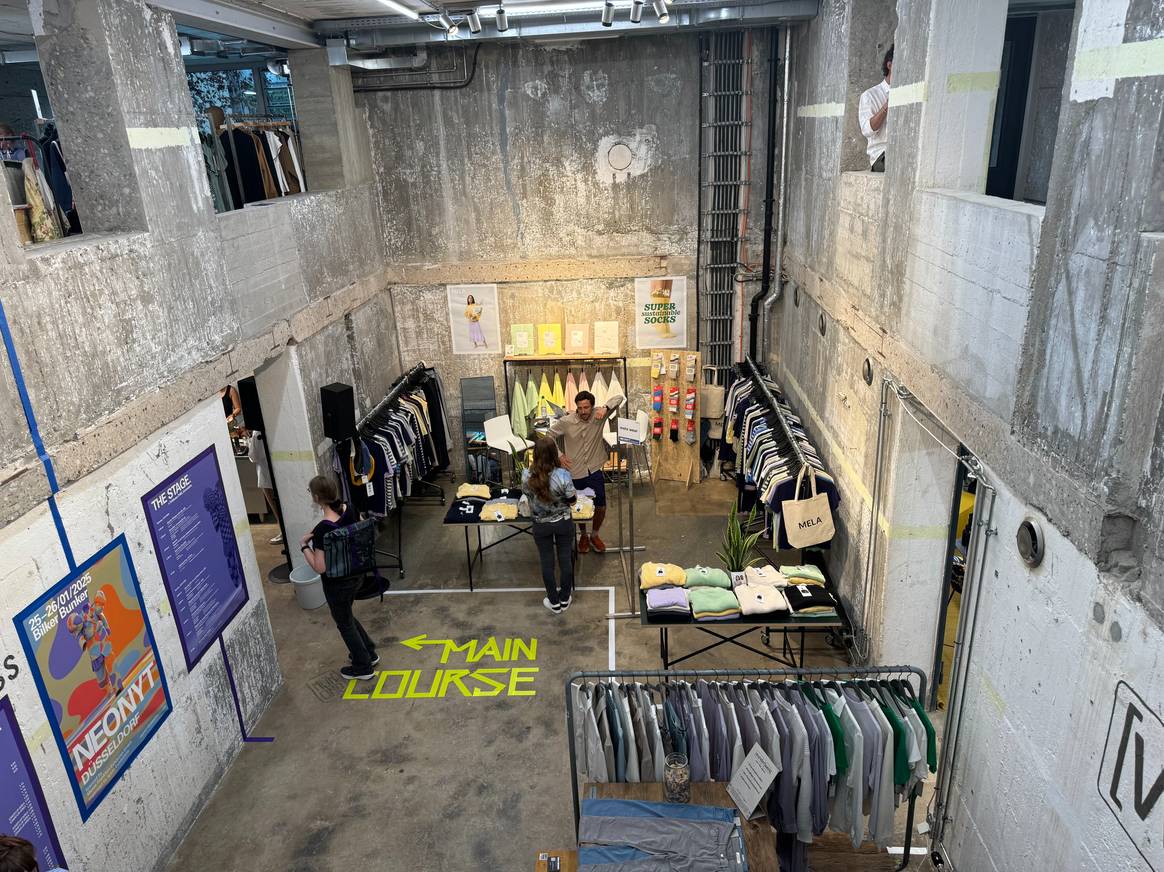
In addition to the few established brands, many upcycling labels and sustainability-orientated start-ups were also at Neonyt. Among them was the Munich label Frijda Jun. For founder Claudia Frühholz, it is not only her first trade fair, but also the start of her wholesale business. She was hoping for more visitors on Saturday afternoon, as she had been unsuccessful in making appointments in advance. She wants to reach boutiques from the DACH market with her minimalist brand, which is in the higher price segment. However, the industry is currently finding it somewhat difficult, says Frühholz. They would stick with their existing partners and show little willingness to take risks.
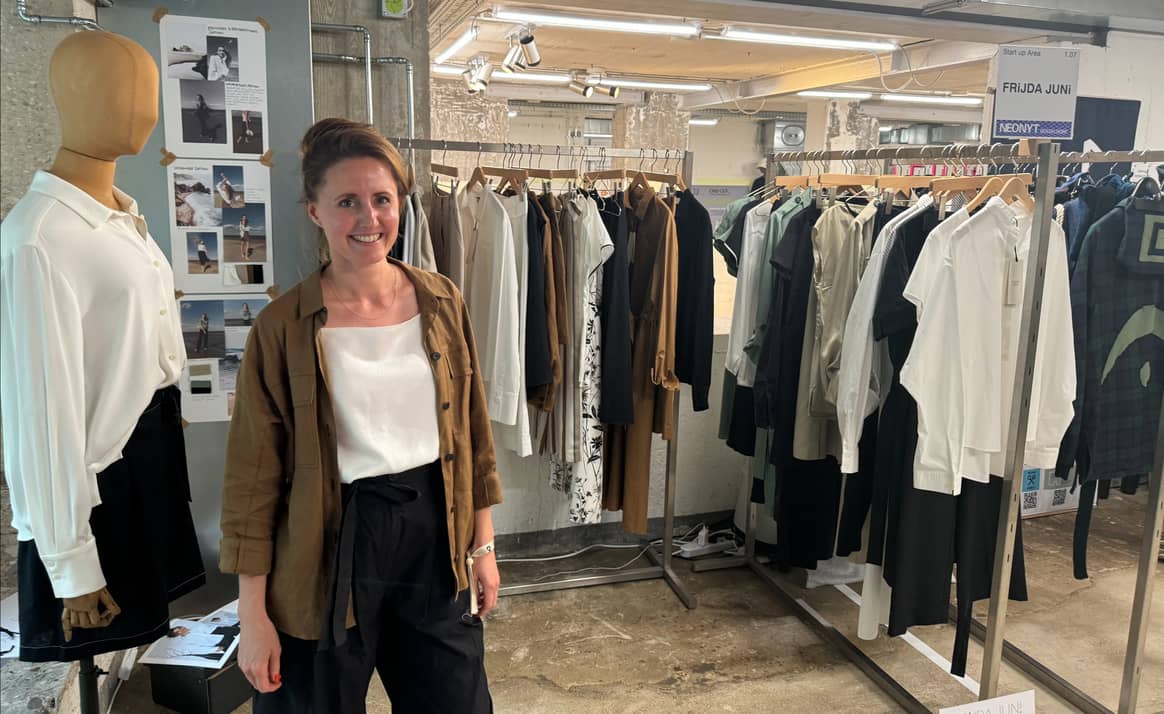
Overall, the three formats seemed to attract international visitors in particular. On Saturday, when many German retailers were probably still working in their stores, French and Dutch, among other languages, could be heard in the aisles of Fashn Rooms.
A Croatian buyer duo also made their way from Areal Böhler to Neonyt and then on to Kaiserswerther Straße to explore the various silhouettes of the order platform during their first visit.
Meanwhile, Supreme was pleased with the growing number of visitors, from foreign buyers and distributors to visitors from the USA, Canada, Japan, Taiwan and Ukraine according to a spokesperson.
This article was originally published on FashionUnited.uk. Translated and edited by Simone Preuss.



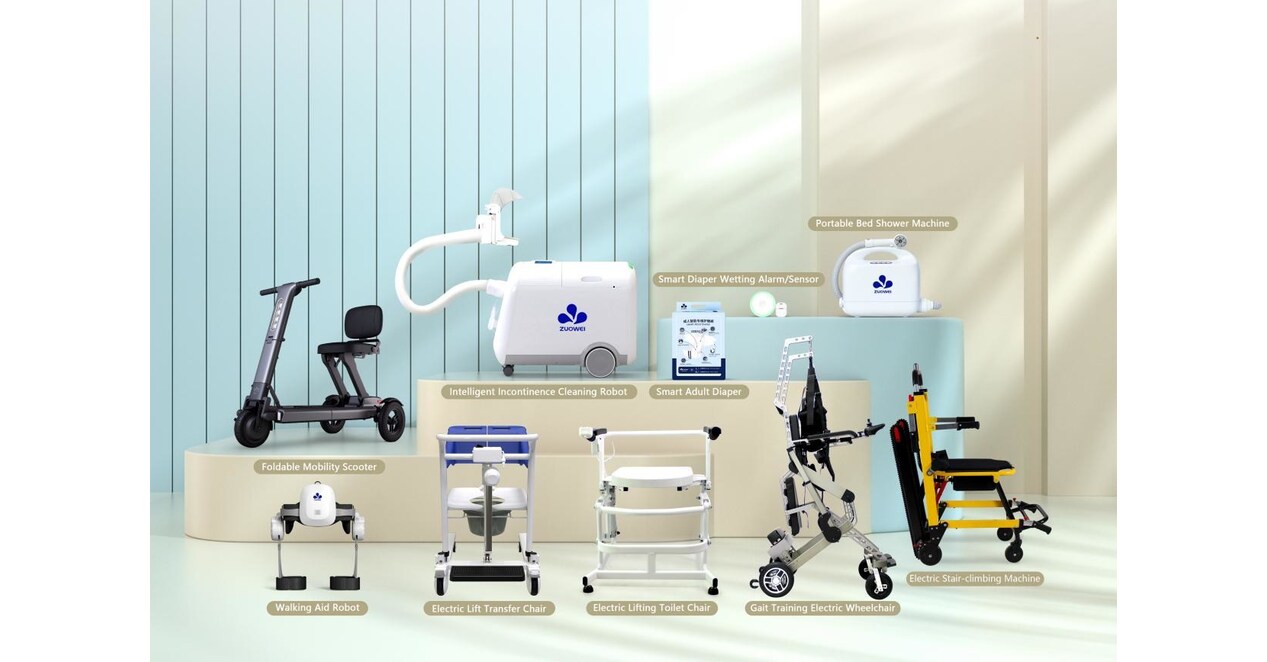
![Suspects In New Orleans, Las Vegas Truck Attacks Reportedly Served On The Same Army Base [Update] Suspects In New Orleans, Las Vegas Truck Attacks Reportedly Served On The Same Army Base [Update]](https://i.kinja-img.com/image/upload/c_fill,h_675,pg_1,q_80,w_1200/746543a4e65ece02e4250617891aecdf.jpg)


